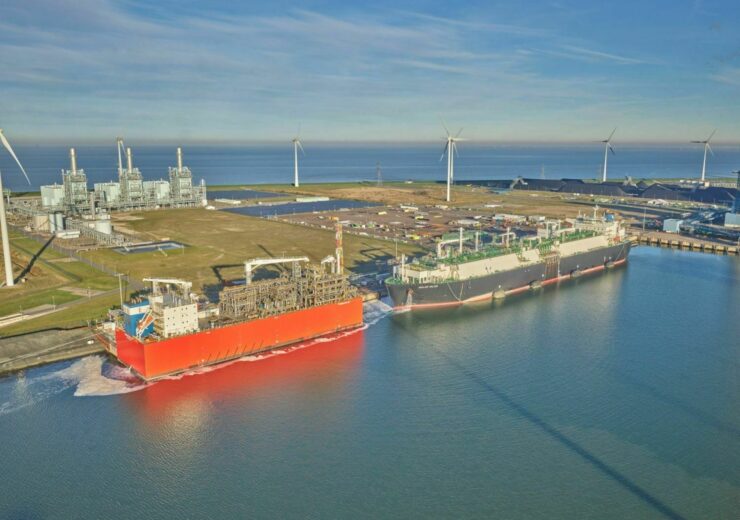Gasunie is in close contact with the Dutch government and the other western European shareholders in Nord Stream regarding stabilisation of the pipelines to prevent further environmental damage and ensure safety

Gasunie writes off Nord Stream fully. (Credit: Gasunie)
Gasunie’s 2022 annual figures clearly show the effects of the unrest in the international energy markets caused by Russia’s invasion of Ukraine. Russia’s aggression triggered resolute action to reduce Europe’s dependence on Russian gas and led to a reversal of the gas flows on the continent.
Han Fennema, CEO: “For Gasunie, 2022 actually started on 24 February when Russia invaded Ukraine. The tragic humanitarian consequences of the war and the geopolitical implications for the energy markets have marked the year for us. In addition to our focus on the gas crisis and our measures to safeguard the security of supply, we also managed to realize our planned investments for the energy transition. This provides a good basis for achieving our Vision 2030 in the coming years.”
Major investments in security of supply and energy transition projects
Gasunie made major efforts to ensure security of supply in 2022, resulting specifically in the completion of the new EemsEnergyTerminal at Eemshaven and the expansion of the Gate terminal in Rotterdam. This has doubled the import capacity for LNG in the Netherlands and allowed a sharp reduction in our country’s dependence on Russian gas.
At the same time, Gasunie also made significant progress in a number of large energy transition projects. The construction work for WarmtelinQ (the heat grid in Zuid Holland) started, the Porthos project (offshore CO2 storage) was developed further and the start of the construction works for the national hydrogen network was announced in June. The delay in the completion of the nitrogen plant in Zuidbroek was disappointing. All efforts are now aimed at completing the construction works in the spring of 2023, after which the nitrogen plant can be tested in the summer and should be fully operational from October 2023.
Higher revenue in 2022, lower tariffs in coming years
The loss of the supply of gas from Russia caused a reversal of gas flows through Europe. Whereas gas previously flowed mainly from East to West, we are now seeing a reversal with gas flowing from north-western Europe to Germany and onwards to Central and Eastern Europe. Gasunie leases and auctions transport capacity in its networks to parties wishing to transport gas from one place in the network to another. The reversal of the gas flows resulted in high additional demand from customers for capacity in Gasunie’s network in the Netherlands and Germany, bumping revenue up by € 872 million to € 2,258 million. At the same time, Gasunie also felt the effects of the high energy prices, specifically the energy costs associated with transporting gas and modifying gas to achieve the right quality. These costs are almost € 300 million higher in 2022 than in 2021, bringing the result after taxation to € 555 million (€ 311 million in 2021).
Janneke Hermes, CFO: “More than 85% of the additional revenue in 2022 falls within the scope of the regulatory powers of the Authority for Consumers and Markets (ACM) in the Netherlands and the Bundesnetzagentur (BNetzA) in Germany. Under the regulations of these supervisory bodies, much of the additional revenue will be returned to Gasunie network users over the next few years in the form of lower tariffs. When the revenue to be offset is deducted from the revenue achieved, the underlying revenue amounts to € 1,515 million (€ 1,369 million in 2021).”
Ambitious investment agenda for the energy transition and carbon reduction
In the upcoming years, we foresee an investment level of at least € 400 million and up to € 700 million a year. Once we have made investment decisions for all our Vision 2030 projects, we may well see our total investment portfolio increase to € 8.5 billion in the period up to 2030.
Nord Stream fully written off
At the time of the publication of its half-year report in July 2022, Gasunie announced that it would reduce the book value of its 9% stake in Nord Stream from € 508 million to € 240 million. In late September, we learned that Nord Stream’s pipelines had been purposely damaged. The two Nord Stream pipelines were no longer being used by Gazprom for gas delivery to Europe at the time of sabotage.
In the current geopolitical context, Gasunie does not foresee a resumption of gas deliveries via Nord Stream for the foreseeable future and, as a result, does not expect to receive any more dividends. So the value of Gasunie’s interest in Nord Stream was reduced to € 0 at the end of 2022. Gasunie is in close contact with the Dutch government and the other western European shareholders in Nord Stream regarding stabilisation of the pipelines to prevent further environmental damage and ensure safety.
Han Fennema to step down, effective from September 2023
Simultaneously with the publication of the 2022 annual figures, CEO Han Fennema has announced that he will leave Gasunie at his own request as of September 2023. By then, Fennema will have held the position of CEO at Gasunie for nearly 10 years. He informed the Supervisory Board and the shareholder of his intention earlier this year to give Gasunie plenty of time to find a successor.
Pieter Duisenberg, Chairman of the Supervisory Board: “Under Han Fennema’s down-to-earth leadership, Gasunie has developed strongly over the past decade as a major player in the energy transition in the Netherlands and Germany. The 2022 annual figures also show that Gasunie is in excellent shape. As someone who is expert at making connections at a personal and business level, Han has managed this development with clarity and dedication. As the Supervisory Board, we very much appreciate his willingness to stay on as CEO for another six months. The procedure for finding a successor has already begun.”
Source: Company Press Release
